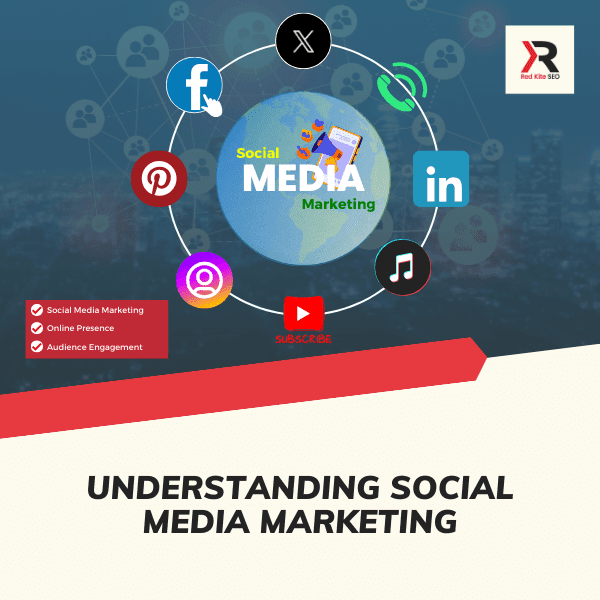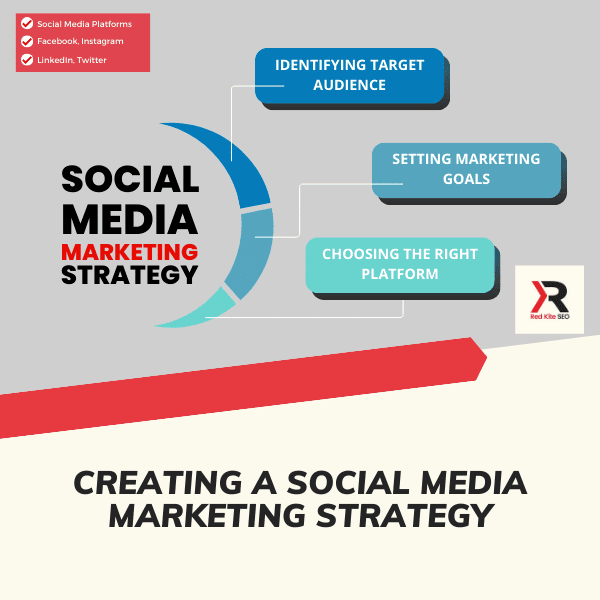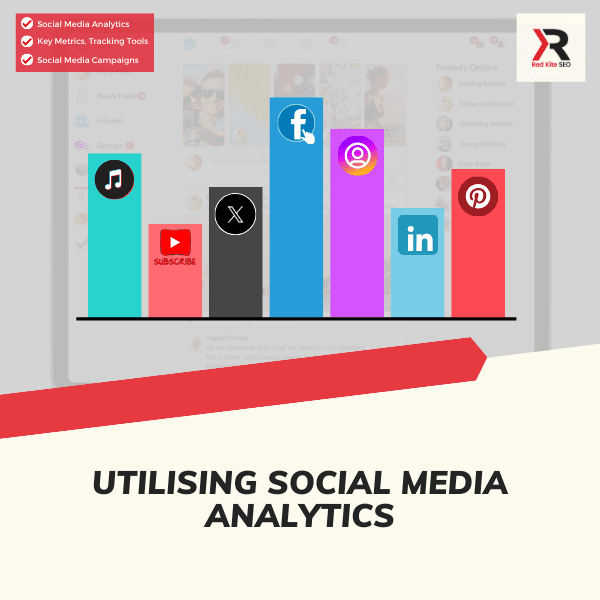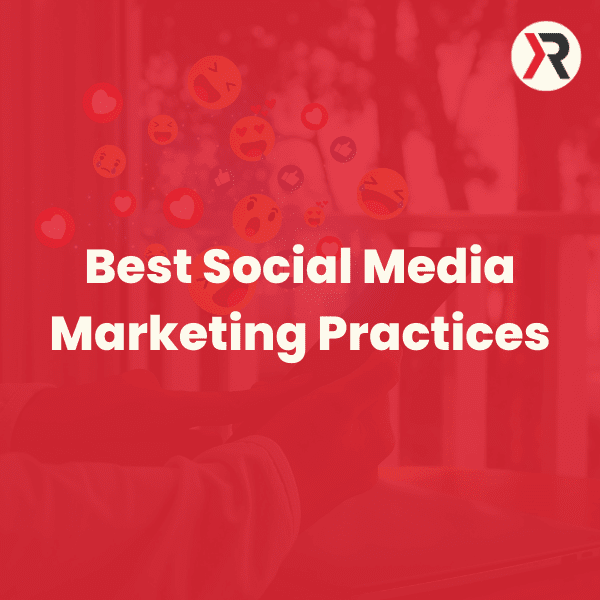Best Social Media Marketing Practises
Are you looking to up your social media marketing game? In this article, we’ll dive into the best practises that will help you boost your online presence.
From understanding the power of social media marketing to creating a solid strategy, we’ll cover it all.
Get ready to engage with your audience, analyse your results, and stay ahead of the game with future trends. Let’s take your social media marketing to the next level!
Understanding Social Media Marketing

To understand social media marketing, you need to grasp its definition and importance. It’s the use of social media platforms to promote products and services, build brand awareness, and engage with target audiences.
Different social media platforms have their own significance, with Facebook being the largest and most popular. Instagram being ideal for visual content, and LinkedIn being effective for professional networking.
Definition and Importance
Understanding the definition and importance of social media marketing is crucial for anyone looking to effectively promote their business profile or brand online.
Social media marketing refers to the use of social media platforms to connect with your target audience, build brand awareness, and drive traffic to your website. It involves creating and sharing engaging content, interacting with your followers, and running targeted advertising campaigns.
The importance of social media marketing lies in its ability to reach a wide audience, increase brand visibility, and generate leads and sales. It allows you to connect with your customers on a personal level, build trust and credibility, and stay ahead of your competitors.
Different Social Media Platforms and Their Significance
As you delve into the world of social media marketing, it’s important to familiarise yourself with the different social media platforms and their significance in order to effectively promote your business or brand online. Each social media platform serves a unique purpose and caters to a specific audience. Understanding the significance of each platform will help you tailor your content and marketing strategies accordingly.
Facebook, with its massive user base, allows you to connect with a wide range of users and build a community around your brand. Instagram is highly visual and ideal for showcasing products and engaging with a younger audience. Twitter, with its real-time updates and trending topics, is great for quick and concise messages. LinkedIn is the go-to platform for professional networking and targeting a B2B audience.
Creating a Social Media Marketing Strategy

To create an effective social media marketing strategy, you need to begin by identifying your target audience. This involves understanding who your ideal customers are, what their needs and interests are, and where they spend their time online.
Once you have a clear understanding of your target audience, you can set specific marketing goals that align with your overall business objectives. These goals should be measurable, attainable, relevant, and time-bound.
Identifying Target Audience
You should regularly evaluate and update your social media marketing strategy by identifying your target audience. Understanding your target audience is crucial for the success of your social media marketing efforts. By knowing who your audience is, you can tailor your content and messaging to effectively reach and engage them.
To identify your target audience, you can use various methods such as conducting market research, analysing demographic data, and monitoring social media analytics. By doing so, you can gain insights into the preferences, interests, and behaviours of your audience, allowing you to create targeted and personalised social media marketing strategies.
This won’t only help you increase your engagement rates but also ensure that your efforts are aligned with marketing best practises.
Setting Marketing Goals
Start by setting clear marketing goals for a successful top social media marketing strategy.
Setting goals is crucial in order to measure the success of your social media efforts and ensure that they align with your overall business objectives. When setting your social media marketing goals, it’s important to be specific, measurable, achievable, relevant, and time-bound (SMART).
Some common social media marketing goals include increasing brand awareness, driving website traffic, generating leads, boosting engagement, and improving customer satisfaction.
By setting clear and actionable goals, you can create a roadmap for your social media marketing efforts and focus on implementing the right practises to follow in achieving them.
Remember to regularly review and adjust your goals as needed to stay on track and maximise your social media marketing success.
Choosing the Right Platform
It’s important to carefully choose the social media platforms that best fit your business goals and target group when making a social media marketing plan. Choosing the right social media platforms is crucial for the success of your marketing campaigns.
Different platforms have different demographics and user behaviours, so it’s important to do your research and understand where your target audience spends their time. For example, if you’re targeting a younger demographic, platforms like Instagram and TikTok might be more effective.
If your target audience is professionals or B2B, platforms like LinkedIn would be a better fit.
Content Creation for Social Media Marketing

When it comes to social media marketing, quality content is key. You need to create engaging and valuable content that resonates with your audience.
This includes using a variety of content types, such as text, images, videos, and infographics.
It’s important to schedule or post content consistently to maintain a strong presence on social media platforms.
Importance of Quality Content
For effective social media marketing, you must create quality content that resonates with your target audience. A well-defined content strategy is crucial for building a successful social media marketing strategy. By focusing on quality content, you can increase your engagement rate and effectively reach your audience.
Quality content refers to content that’s valuable, relevant, and engaging to your target audience. It should be informative, entertaining, and shareable. When creating content for social media marketing, it’s important to understand your target audience’s preferences and interests. By tailoring your content to meet their needs, you can increase your engagement rate and build a loyal following.
Types of Content: Text, Images, Videos, Infographics
To effectively create content for social media marketing, you can engage your audience using various types of content such as text, images, videos, and infographics. Each type of content has its own unique benefits and can help you connect with your target audience in different ways.
Text: Text-based content allows you to convey information in a concise and straightforward manner. It’s great for sharing updates, news, and blog posts. It can also be used to ask questions and spark conversations with your audience.
Images: Images are powerful tools for capturing attention and evoking emotions. They can be used to showcase products, share behind-the-scenes glimpses, and create visual stories. Social media images are highly shareable and can help you boost engagement on social media platforms.
Videos: Videos are highly engaging and can captivate your audience’s attention. They’re perfect for demonstrating products, sharing tutorials or educational content, and telling stories. Videos can help you create a more personal and authentic connection with your audience.
Infographics: Infographics are visual representations of information and data. They’re an effective way to present complex information in a visually appealing and easy-to-understand format. Infographics can help you simplify complex concepts, increase shareability, and enhance your brand’s credibility.
Content Scheduling and Consistency
To maintain an effective content strategy for social media marketing, consistency in content scheduling is crucial.
By creating a consistent posting schedule, you can ensure that your audience knows when to expect new content from you. This helps to build trust and engagement with your followers.
Content scheduling also allows you to plan and create content in advance. It will save time and ensure that you always have something to share.
Social media management tools, such as Hootsuite or Buffer, can help you schedule and automate your social media posts across multiple platforms. Social media tools allow you to plan and schedule your content in advance, so you can focus on other important aspects of your business.
Engagement and Interaction in Social Media Marketing

Now let’s talk about the importance of engagement and interaction in social media marketing.
Engaging with your audience is crucial for building a strong online presence and fostering meaningful connections.
In order to increase interaction, you can employ various strategies such as asking questions, running contests, or sharing user-generated content.
It’s important to handle negative feedback and criticism gracefully, addressing concerns and providing solutions whenever possible.
Importance of Engagement
One crucial aspect of successful social media marketing is ensuring high levels of engagement with your audience. Engagement is the key to building strong relationships with your followers and customers, and it plays a significant role in the success of your social media marketing efforts.
When you engage with your audience, you show that you value their opinions and feedback, and you create opportunities for meaningful interactions. By actively participating in conversations, responding to comments and messages, and sharing content that’s contextually relevant to your audience, you can foster a sense of community and loyalty.
Engagement helps you to understand your audience better, gather valuable insights, and adapt your social strategy accordingly. It’s essential to prioritise engagement in your social media marketing efforts.
Strategies for Increasing Interaction
Increase interaction in your social media marketing by implementing effective strategies. One of the key strategies for increasing interaction is to focus on creating compelling content. Your content should be relevant, engaging, and shareable, as this will encourage your audience to interact with it.
It’s important to track and analyse social media metrics to understand what types of content are resonating with your audience and generating the most engagement. Use this data to refine your content strategy and create more of what works.
Another effective strategy is to actively engage with your audience by responding to comments, messages, and mentions. This shows that you value their input and encourage them to continue interacting with your brand.
Handling Negative Feedback and Criticism
Handling negative feedback and criticism is a crucial aspect of social media customer service. When faced with negative comments or criticism, it’s important to respond promptly and professionally. Acknowledge the concern and empathise with the customer’s experience.
Offer a solution or alternative, if possible, to demonstrate your commitment to resolving the issue. Engage with your audience by actively listening to their concerns and addressing them publicly. This shows transparency and builds trust with your followers.
Remember to remain calm and composed, even in difficult situations, and always respond in a respectful manner. By effectively handling negative feedback and criticism, you can turn a dissatisfied customer into a loyal advocate for your brand.
Utilising Social Media Analytics

Now it’s time to understand the importance of analytics in your social media marketing efforts.
By utilising social media analytics, you can gain valuable insights into the performance of your campaigns and understand key metrics such as reach, engagement, and conversions.
There are various tools available that can help you track and analyse your social media analytics, allowing you to make data-driven decisions and optimise your marketing strategy for better results.
Importance of Analytics in Social Media Marketing
To effectively utilise social media analytics in your social media marketing strategy, it’s essential to understand the importance of tracking and analysing data.
Analytics play a crucial role in measuring the success of your social media marketing efforts and determining the effectiveness of your campaigns. By utilising social media marketing tools, you can gather valuable insights into your audience’s behaviour, preferences, and engagement levels.
These insights can help you make data-driven decisions and optimise your social media marketing practises. Analytics also allows you to track the performance of your social media ads, helping you identify which campaigns are generating the most conversions and return on investment.
Understanding Key Metrics
If you want to use social media analytics in your social media marketing plan, you need to know the key metrics that will help you see how well your campaigns are doing and make decisions based on data.
Key metrics are essential for evaluating the performance of your social media marketing efforts and determining their impact on your overall business goals. These metrics can include engagement rate, reach, impressions, click-through rate, conversion rate, and more.
By tracking and analysing these metrics, you can gain valuable insights into your audience’s behaviour, preferences, and effectiveness of your content and campaigns.
To access these metrics, you can use a social media management tool, which allows you to monitor and analyse data from different platforms in one place.
As a social media marketer, understanding and utilising key metrics will help you optimise your strategies, improve your ROI, and drive better results for your business.
Tools for Tracking Social Media Analytics
To effectively track social media analytics and utilise them for your marketing strategy, you can use various tools. These tools help you understand the performance of your social media campaigns, measure engagement, and gain insights into customer behaviour. By tracking social media analytics, you can make data-driven decisions and optimise your marketing efforts for better results.
Here are some popular tools for tracking social media analytics:
| Tool | Features |
| —- | ——– |
| Google Analytics | Provides detailed website traffic data, including social media referrals and conversions. |
| Sprout Social | Offers comprehensive social media analytics, including audience demographics, engagement metrics, and competitor analysis. |
| Hootsuite | Allows you to monitor and measure social media performance across multiple platforms, schedule posts, and track campaign effectiveness. |
These tools help you track key metrics such as reach, engagement, click-through rates, and conversions. By analysing these metrics in a contextually relevant manner, you can understand the impact of your social media efforts and make informed decisions to optimise your marketing strategy.
Case Studies of Successful Social Media Marketing

Now let’s take a closer look at some real-life examples of successful social media marketing campaigns.
In Case Study 1, we’ll explore how a small clothing brand increased its online visibility and sales through strategic social media content.
Case Study 2, will highlight a tech company’s use of influencer marketing to reach a wider audience and build brand credibility.
In Case Study 3, we’ll examine how a restaurant utilises user-generated content to create a buzz and attract new potential customers.
These case studies will provide valuable insights and practical tips for your own social media marketing efforts.
Case Study 1
Learn about one of the most successful social media marketing case studies by examining how using specific strategies and tactics helped a company achieve impressive results.
This case study highlights the importance of social media marketing in driving business growth. By implementing well-designed social media campaigns and effective social media management, the company was able to reach a larger audience and increase brand awareness.
Social media team conducted a thorough competitive analysis to identify gaps in the market and tailor their social media content accordingly. The company also utilised various social media platforms to engage with its target audience and build meaningful relationships.
As a result, they experienced a significant increase in website traffic, customer engagement, and ultimately, sales.
This case study exemplifies the power of strategic social media marketing in achieving tangible business outcomes.
Case Study 2
Explore how implementing targeted social media campaigns can significantly boost your brand’s online presence and customer engagement.
One case study that highlights the effectiveness of social media marketing practises is the campaign by Dove, called ‘Real Beauty Sketches.’ Dove created a series of videos that aimed to challenge the perception of beauty and empower women.
The campaign was shared on various social media platforms, resulting in millions of views and shares. By using emotional and relatable content strategies, Dove successfully connected with their target audience and sparked conversations around self-esteem and beauty standards.
This case study demonstrates the power of well-executed social media campaigns and the importance of understanding your audience’s values and interests to create impactful content.
Case Study 3
Continuing the discussion from the previous subtopic, let’s delve into another case study that showcases the success of social media marketing practises.
In this case study, we’ll explore a company that implemented an effective social media strategy to launch a successful social media campaign.
The case study focuses on a well-known brand that wanted to increase its online presence and engage with its target audience. To achieve this, the company developed a comprehensive social media strategy that incorporated various social media marketing practises.
They identified their target audience, created engaging content, and utilised different social media platforms to reach their audience effectively.
Through their social media campaign, the company was able to increase brand awareness, drive traffic to their website, and lead generation. They saw a significant increase in social media followers, engagement, and conversions.
This case study highlights the importance of implementing an effective social media strategy and utilising various social media marketing best practises to achieve success in today’s digital landscape.
Legal and Ethical Considerations in Social Media Marketing

When it comes to social media marketing, it’s crucial to understand the policies and regulations that govern the platforms. This includes being aware of the legal implications of using copyrighted content and ensuring that your marketing practises comply with data protection laws.
Ethical considerations such as being transparent with your audience and avoiding deceptive practises should guide your social media marketing strategy.
Understanding Social Media Policies and Regulations
Understanding social media policies and regulations is crucial for ensuring legal and ethical considerations in your social media marketing efforts.
Social media policies provide guidelines for acceptable behaviour on social platforms, while regulations ensure compliance with laws and industry standards.
By understanding these policies and regulations, you can avoid legal pitfalls and reputational damage.
It’s important to stay up-to-date with the ever-changing landscape of social media and understand the specific policies and regulations that apply to your industry and target audience.
Contextually relevant content is essential to engage your audience while adhering to legal and ethical boundaries.
Regularly reviewing and updating your social media policies and staying informed about new regulations will help you maintain a strong and compliant social media presence.
Ethical Considerations
To ensure ethical practises in your social media marketing, it’s important to consider legal and ethical boundaries.
Ethical considerations play a crucial role in shaping your social media content and marketing strategy. When creating social media content, it’s essential to be transparent, honest, and respectful towards your audience. Avoid spreading false information or engaging in deceptive practises that could harm your brand’s reputation.
Be mindful of the content types you choose to share and promote. Ensure that your content aligns with your values and doesn’t promote discrimination, hate speech, or any form of offensive material.
Crisis Management in Social Media Marketing
How can you effectively handle crises in social media marketing while ensuring legal and ethical considerations are met?
Crisis management is an essential aspect of social media marketing, as it allows businesses to respond to and resolve issues that may arise on these platforms. To effectively handle crises, it’s important to follow best practises for social media marketing.
Establish clear brand guidelines and policies for social media use within your organisation, ensuring that employees are aware of the legal and ethical boundaries.
Monitor social media channels regularly to identify any potential crises before they escalate.
Respond promptly and transparently to any issues or complaints, demonstrating empathy and a commitment to resolving the problem.
Finally, learn from each crisis and make necessary improvements to avoid similar situations in the future.
Future Trends in Social Media Marketing

Get ready to explore the exciting future of social media marketing.
Emerging social media platforms are constantly popping up, providing new opportunities for businesses to reach their target audience.
The role of AI and machine learning in social media marketing is becoming increasingly important, allowing for more personalised and targeted campaigns.
The impact of augmented reality (AR) and virtual reality (VR) on social media marketing can’t be ignored, as these technologies offer immersive and engaging experiences for users.
Emerging Social Media Platforms
As a social media marketer, you need to stay ahead of the game by exploring emerging marketing platforms that will shape the future of social media marketing. With the continuous evolution of technology and the ever-changing preferences of social media users, it’s crucial to keep an eye on emerging social media platforms.
These new platforms provide fresh opportunities to engage with your target audience and expand your reach. Some emerging social media networks include TikTok, Clubhouse, and Twitch.
TikTok, with its short-form video content, has gained massive popularity among younger audiences. Clubhouse, an audio-based social networking app, allows users to participate in live discussions and connect with industry experts. Twitch, a streaming platform primarily focused on gaming, offers opportunities for influencers and brands to connect with a highly engaged community.
Role of AI and Machine Learning in Social Media Marketing

To stay ahead in social media marketing, you should leverage the role of AI and machine learning for future social media trends. AI and machine learning are revolutionising the way businesses approach social media marketing.
With the vast amount of data generated on social media platforms, AI and machine learning algorithms can analyse this data in real-time and provide valuable insights. These insights can help businesses understand their target audience, better optimise their content marketing strategies, and improve their digital marketing campaigns.
AI assists in the automation of repetitive tasks, such as scheduling posts and responding to customer inquiries, allowing marketers to focus on more strategic initiatives.
Impact of AR and VR on Social Media Marketing
Embrace the impact of AR and VR on social media marketing to stay ahead of future trends and take your digital campaigns to the next level.
AR (Augmented Reality) and VR (Virtual Reality) are transforming the way brands engage with their audience on social media platforms. These technologies offer immersive and interactive experiences that capture users’ attention and create a lasting impact.
With AR, you can overlay digital elements in the real world, allowing users to interact with your products or services in a virtual setting.
VR transports users to a completely virtual environment, enabling them to explore and experience your brand in a unique way.
By incorporating AR and VR into your social media marketing strategies, you can enhance brand storytelling, drive engagement, and differentiate yourself from competitors.
Stay ahead by embracing these technologies and leveraging their impact on social media marketing.
Frequently Asked Questions
How Can I Measure the Success of My Social Media Marketing Efforts?
To measure the success of your social media marketing efforts, track key metrics like engagement, reach, and conversions. Use analytics tools provided by social platforms to gather data and analyse your performance regularly.
What Are the Social Media Best Practises for Managing Negative Feedback or Comments?
When managing negative feedback or comments on social media platforms, it’s important to respond promptly, address the issue directly, and offer a solution. Don’t ignore or delete comments, which can create a negative impression.
How Often Should I Post on Social Media to Maintain an Effective Presence?
You should post on social media frequently to maintain an effective presence. Consistency is key to engaging with your audience and staying top of mind. Experiment with different posting frequencies to find out what works best for your brand.
What Are Some Effective Ways to Increase Engagement and Interaction With Followers on Social Media?
To increase engagement and interaction with your followers on social media, try asking questions, responding to comments, and sharing user-generated content. These practises can help foster a sense of community and make your followers feel valued.
Are There Any Legal Regulations or Guidelines That I Need to Be Aware of When Conducting Social Media Marketing Campaigns?
When conducting social media marketing campaigns, you need to be aware of legal regulations and guidelines. Make sure you comply with laws regarding privacy, copyright, and advertising to avoid any legal issues.
| Glossary of Related Terms | |
|---|---|
| Related Term | Definition |
| Advertising Campaign | A series of promotional activities designed to achieve specific marketing goals or objectives. |
| Best Practise | An established method or technique that is widely accepted as the most effective or efficient way to achieve a desired outcome. |
| Search Engine Optimisation (SEO) | The process of optimising a website or online content to improve its visibility on search engine results pages. |
| Social Content | Content created for and shared on social media platforms to engage and interact with the audience. |
| Social Media Manager | An individual or professional responsible for managing and overseeing an organisation’s presence on social media platforms. |
| Social Networks | Online platforms that facilitate social interactions and connections between individuals or groups. |
| Web Content | Text, images, videos, or other forms of media that are published on the internet and accessible through web browsers. |
| Computing Platform | A hardware or software environment where applications and services can be run. |
| Content Calendar | A schedule that outlines the planned publication dates and topics for content creation and distribution. |
| Marketing Campaign | Coordinated and organised efforts to promote a product, service, or brand with a specific goal in mind. |
| Organic Content | Content that is naturally discovered and shared by users without paid promotion or advertising. |
| Quantity | The numerical amount or volume of something. |
| Social Media Audience | The group of individuals who follow and engage with a brand or individual on social media platforms. |
| Social Media Goal | A specific objective or target that a business or individual aims to achieve through social media activities. |
| Social Media Management Tools | Software or platforms that assist in scheduling, analysing, and managing social media content and interactions. |
| Social Media Marketing Platforms | Online platforms that provide tools and features for businesses and individuals to promote their products or services on social media. |
| Social Media Marketing Tips | Guidelines and strategies to enhance the effectiveness of social media marketing efforts. |
| Social Presence | The overall visibility and activity of a brand or individual on social media platforms. |
| Content Decisions | Choices made regarding the creation, curation, and distribution of content to achieve specific goals. |
| Content Formats | The various types and structures of content, such as text, images, videos, infographics, etc. |
| Customer Experiences | The interactions and perceptions customers have with a brand throughout their journey. |
| Following Social Media | The act of subscribing or connecting with a user or brand on social media platforms to receive updates. |
| Form of Marketing | The method or approach used to promote and sell products or services, such as digital marketing, influencer marketing, etc. |
| Frequency of Posts | How often content is published on social media platforms within a specific time frame. |
| Location-Based Marketing | Targeting and delivering marketing messages to individuals based on their geographic location. |
| Management Software | Applications or tools that help in planning, organising, and overseeing projects and tasks. |
| Organic Engagement | User interactions with content that occur naturally, without paid promotion or advertising. |
| Posting Frequency | The rate at which content is posted on social media platforms. |
| Posting Schedules | Planned times and dates for publishing content on social media platforms to maximise reach and engagement. |
| Project Management | The process of planning, executing, and overseeing projects to achieve specific goals and meet predefined success criteria. |
| Social Marketing | The use of marketing principles and techniques to promote social causes, behaviours, or ideas. |
| Social Media Account | An individual or business’s profile on a social media platform. |
| Social Media Channel | A specific social media platform or communication channel used for content distribution and interaction. |
| Social Media Content Calendar | A tool or document that helps plan and schedule social media content over a specified period. |
| Social Media Listening | The process of monitoring and analysing social media platforms for mentions and discussions related to a brand or topic. |
| Social Media Managers | Professionals responsible for creating, curating, and managing content on social media platforms for a brand or individual. |
| Social Media Marketing Platform | Software or online platforms designed to assist in the planning, execution, and analysis of social media marketing campaigns. |
| Social Media Monitoring | The continuous tracking and analysis of social media channels to observe trends, sentiments, and mentions relevant to a brand or topic. |
| Social Media Tool | Software or application designed to assist in managing, analysing, and optimising social media activities. |
| Social Network | An online platform that enables users to connect, share content, and interact with others. |
| Social Publishing | The process of creating and distributing content on social media platforms. |
| Spend Time | The amount of time allocated or invested in a particular activity or task. |
| Target Market | A specific group of consumers that a business aims to reach with its products and marketing efforts. |
| User Generated Content | Content created by the audience or users of a product or service, often shared on social media platforms. |

Pete Hogg is an accomplished SEO consultant with a proven track record of driving organic traffic and boosting online visibility. With 8 years of experience in the ever-evolving world of digital marketing, he has helped businesses achieve top rankings on search engines. A passionate advocate for SEO best practises, Pete Hogg combines technical expertise with a deep understanding of content strategy to deliver results that matter. When not optimising websites, he enjoys wheelchair rugby. Connect with Pete Hogg to take your online presence to the next level.

